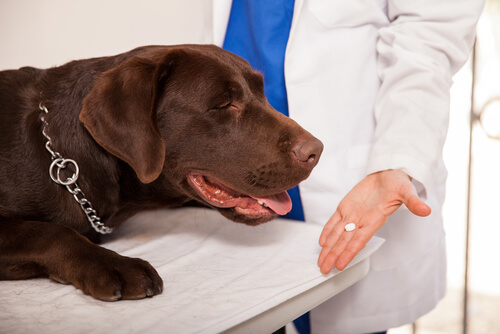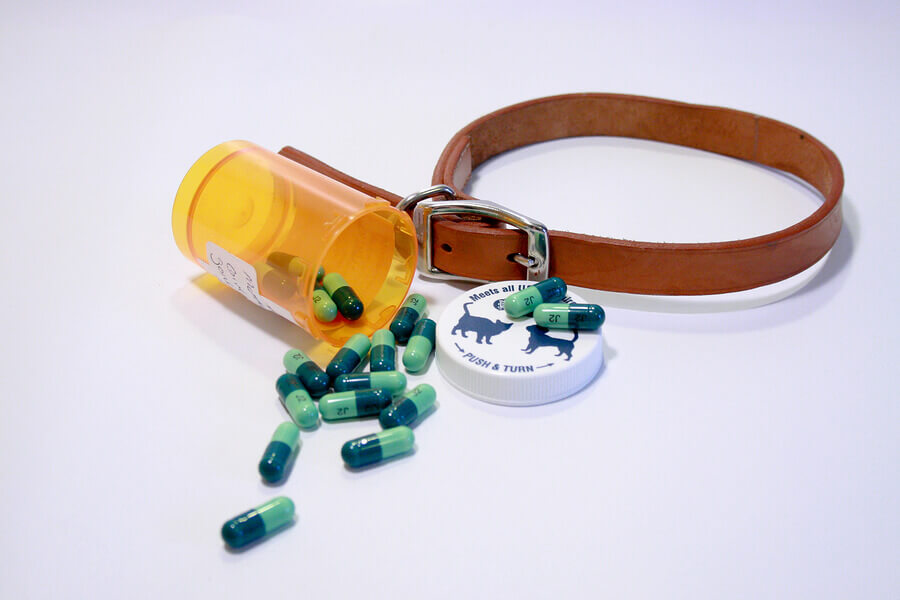Can Dogs Take Medications Made for Humans?

If there’s one thing we’ll never recommend, it’s medicating your dog on your own. Any time you suspect your dog is suffering from a health problem, consulting with a professional is your only option. When dogs take medications made for humans, the consequences can be very serious.
In other words, your negligence could end up costing you a lot more than a visit to the vet. In fact, it may cost you the life of your pet.
While humans are also mammals and our bodies work in a similar way, dogs and animals are also very different. And the side effects that medications produce vary greatly from one species to another.
The toxicity of anti-inflammatory medications in dogs
Ibuprofen, aspirin, and acetaminophen are all medications that you can find in almost every home. They help to calm the effects of mild to moderate pain. What’s more, ibuprofen is an antipyretic, meaning it helps to reduce fever.
It’s common for us to take these medications when we have some mild illness, headache, muscle pain, or the flu. These types of pharmaceuticals are the over-the-counter medications that we can tend to abuse.
Given how often we take them and the fact that they’re always on hand leads some people to believe that they can also use them to treat symptoms in pets. However, their use is extremely dangerous in animals and, in this particular case, can be lethal to dogs.

Medications made for humans exceed the lethal dose for dogs
The therapeutic amount of acetaminophen that your dog can take is very small (15mg/kg) in comparison to that of humans. And the lethal dose (150mg/kg) is very low considering that capsules for humans usually come in units of 500mg per 1 gram of product. In other words, a capsule of acetaminophen for humans is well above the lethal dose for dogs.
This means that, if a dog weighing 10 kilos takes one of these pills, it will be five times over the lethal dose. Without urgent medical attention, the animal will likely die.
How do pharmaceuticals act in the body?
The speed at which the first symptoms appear depends on how long the medications take to circulate through the bloodstream and reach the target organ. Normally, pharmaceuticals circulate through the blood until they’re metabolized by the liver and filtered by the kidneys. The time these organs take to metabolize depends on the concentration of the product, among other factors.
The speed of the metabolism of pharmaceuticals is not the same in every dog. In some, metabolism can be so fast that it never reaches toxic concentrations in the blood. In others, however, it can be very slow, meaning even very low or normal doses can produce toxic effects.
There are a number of factors that influence the speed at which a dog’s body will metabolize pharmaceuticals. The principal factors are the following:
- The pharmacological interactions of other medications that your pet may be taking
- The animal’s genes
- Any disease your dog may have.

What symptoms does intoxication from medications produce?
Some of the common symptoms that result from intoxication are:
- Anorexia or lack of appetite
- Vomiting
- Abdominal pain
- Lethargy
- Dehydration
- Jaundice – the skin and mucous membranes take on a yellowish coloring due to the malfunctioning of the liver
- Swelling of the feet
- Bruising – this also occurs with aspirin
- Increased temperature – this is a typical symptom of aspirin consumption
- Cyanosis – parts of the animal’s body become bluish in color due to a lack of oxygenation of the blood
- Breathing difficulties or dyspnea – NSAIDs are pharmaceuticals that impede the oxygenation of tissues by adhering to the proteins in the blood
- Tachycardia
- Coma
- Death from kidney or liver failure
NSAIDs also damage the gastrointestinal mucus membrane. That’s because they inhibit prostaglandins, molecules that are responsible for protecting the intestine by producing a mucous that lubricates the surface and reduces the secretion of gastric acid.
What’s more, when dogs ingest medications made for humans, the effects of toxicity can make the original problem even worse. And, as a result, the veterinarian may have a harder time making a diagnosis. For all of these reasons, the only viable option for dealing with any illness in pets is to seek veterinary attention as soon as possible.
All cited sources were thoroughly reviewed by our team to ensure their quality, reliability, currency, and validity. The bibliography of this article was considered reliable and of academic or scientific accuracy.
- MSD manuals. Metabolismo de los fármacos.
- Ortocanis. Efectos secundarios de los antiinflamatorios en perros y gatos.
- Affinity. Intoxicación por AINEs.
- PortalVeterinaria. Uso racional de AINE en el perro.